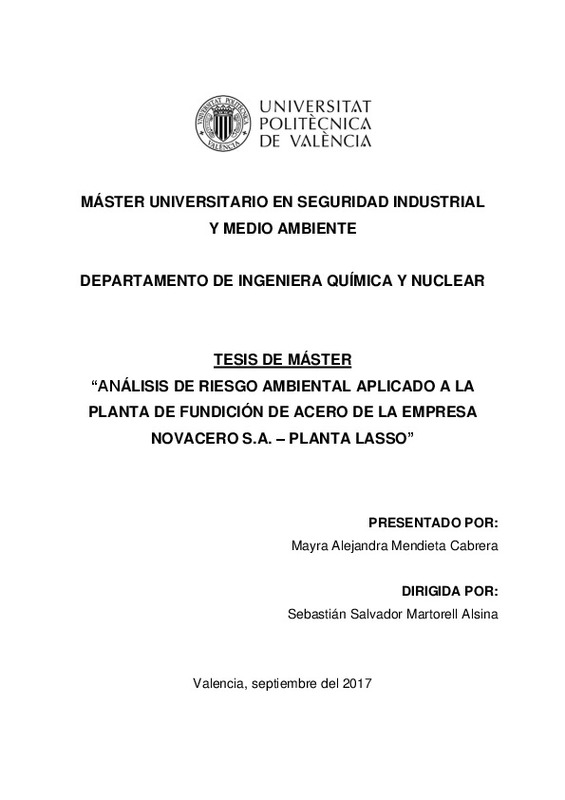|
Resumen:
|
[EN]
In this work, a risk analysis of the possible accidental events is made with the chemical
substances used for production and for auxiliary systems in Novacero S.A. Planta Lasso, that
is dedicated to the production ...[+]
[EN]
In this work, a risk analysis of the possible accidental events is made with the chemical
substances used for production and for auxiliary systems in Novacero S.A. Planta Lasso, that
is dedicated to the production of hot rolled steel; to provide an environmental management tool
that allows the development of measures to control this type of risk in order to maintain its
security and environmental responsibility policy in accordance with the internal commitment
and current legal requirements.
In Ecuador, current legislation requires that all industrial activities are integrally responsible for
the generation of environmental impacts, it has been determined that the environmental
problems associated with industrial activities are mainly caused by the use of chemical
substances and waste management, and must include in their costs the necessary measures
to prevent, avoid and reduce any type of pollution from their productive activities.
The environmental risk analysis examines the possible accidental scenarios and the frequency
with which they can be carried out, according to the particular activities of the company;
determining the value of environmental damage. The methodology used in this work has been
proposed by MAPFRE Foundation, adapted to the particular conditions of the company and is
a generic tool based on the use of environmental indicators, which allows to measure the
management of a company and the opportunities for improvements for the minimization of the
risks, depending on the probability and frequency.
In the risk assessment, an initial classification of the substances was made based on their
hazard and amount used, subsequently according to the value of the environmental risk it was
determined that the company presents a moderate risk in most scenarios and that the
scenarios that Are located in the ALARP region can be reduced to lower levels.
[-]
El objetivo del presente trabajo es desarrollar una metodología y su aplicación al análisis de riesgo ambiental para una empresa dedicada a fundición de acero en ecuador.
Esta metodología abarca el análisis de los ...[+]
El objetivo del presente trabajo es desarrollar una metodología y su aplicación al análisis de riesgo ambiental para una empresa dedicada a fundición de acero en ecuador.
Esta metodología abarca el análisis de los cuatro componentes (fuentes de riesgo, sistemas de control primario, sistema de transporte y receptores vulnerables), indicados de un modo directo y de fácil aplicación. Se basa en la evaluación de dos factores; las fuentes de peligro y los receptores vulnerables. Se divide en dos subfactores: área afectada, vulnerabilidad del entorno natural y socioeconómico.
Mediante esta metodología y el análisis de estos factores fundamentales, se obtiene un Valor ó Índice de Riesgo Medioambiental (ICM). El Valor ó Índice de Riesgo Medioambiental permite la evaluación del riesgo como proceso posterior a dicho análisis, mediante el cual se realiza una posterior toma de decisiones, en aras de reducir o erradicar los riesgos analizados que generan daños ambientales considerables.
[-]
|







